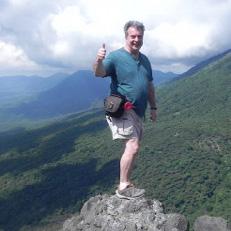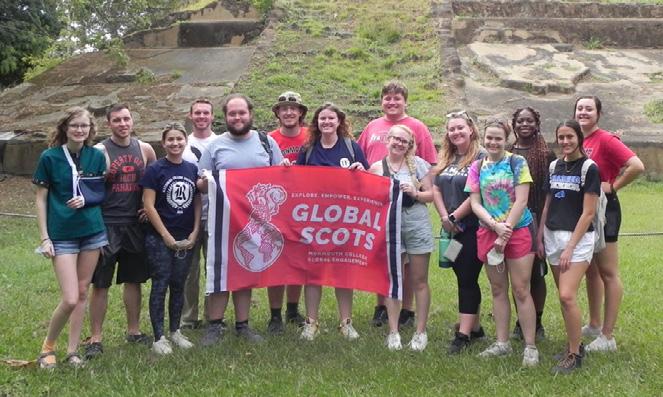
6 minute read
academics
ACADEMICS
Rocking in the new year in El Salvador
Advertisement
While many folks spent New Year’s Day watching bowl games, snacking or sleeping in, a group from Monmouth College celebrated the first day of 2022 in a much more adventurous fashion, traveling via horseback to the top of a volcano in the Central American country of El Salvador.
“I’ve got to imagine that was a first for some,” said welltraveled Monmouth biology professor James Godde of the equine companions for the 13 students who made the trip. “Many of the trips I’ve led have been over Christmas break, and I try to schedule a really cool experience on New Year’s Day, like when our group visited Machu Picchu (in Peru). I wanted to have a super-cool experience in El Salvador, and this really was.”
“While El Salvador wasn’t my first time out of the country, it certainly took me the furthest out of my comfort zone than any travel I’ve done in the past,” said Shannon Wilbourne ’22. “Professor Godde will be the first to tell you getting uncomfortable is what travel’s all about.”
The students had taken an “Academic Travel” Reflections course taught by Godde that emphasized ideas such as mindful travel and making pilgrimages. It was similar in that respect to other Reflections-inspired trips that Godde has led to Colombia and Belize, which also featured visits to old churches, Mayan ruins and other sacred sites.
A slight difference was that this year’s group consisted of students from two Godde classes. His planned trip abroad with the students who took his class in the fall of 2020 was canceled due to the pandemic.
Godde, however, kept his string of years traveling abroad intact. His Belize trip ended in the first days of 2020, two months before the pandemic began. The El Salvador group left the United States on Dec. 28, providing him his 2021 international travel just days under the wire. His streak started by leading a Monmouth study-abroad trip to Japan in 2006, the year before he spent a sabbatical there.
“This was my first time in El Salvador,” said Godde. “One of my criteria when planning these trips is to try to find a brand-
new location. I want it to be a new adventure.” ‘We spent New Year’s Eve “One highlight of the trip was interacting with the people of in the streets of Suchitoto El Salvador,” said Wilbourne. “We spent New Year’s Eve in the streets of Suchitoto lighting off fireworks with neighborhood lighting off fireworks with kids. The trip was a great opportunity to put my Spanish into practice and connect neighborhood kids.’ with the locals.” Godde said some eyebrows were raised over traveling to El Salvador, and that caused some students to stay home, along with COVID concerns. But he said those who made the trip were impressed by the country, which is bordered by Honduras, Guatemala and the Pacific Ocean. “We saw the really good side of El Salvador,” said Godde. “It can have a bad reputation—even scary—but we never had a single trouble. It’s not on a lot of people’s ‘to see’ list, but it really should be, because it was fabulous.” “I think the greatest highlight of the trip was scaling the active volcano Izalco, which is considered the second most difficult volcano to climb in El Salvador,” said Wilbourne. “That hike is the most terrifying and impressive feat I’ve accomplished in my life. Before we even started our trek up the mountain, we had to walk down 1,475 steps. After the grueling descent from the summit of the volcano, down sand and loose rocks, we had to make our way up those steps again.” Other highlights of the trip were relaxing at Lago de Coatepeque, a crater lake in the western portion of the country, and spending the last full day in the country on the beach. “I’ve learned from experience to schedule the beach day later in the trip,” said Godde. “That way, I can tell the students, ‘If you get through this, there’s the beach day at the end.’” —barry mcnamara

Godde atop Izalco Volcano The Monmouth College travelers pause for a photo at the Casa Blanca archaeological site in Chalchuapa.
If you se ACADEMICS e something, say something
Students in professor Andre Audette’s political psychology class surveyed more than 1,200 persons throughout the United States.

By Barry McNamara
Students examined how 9/11 phrase changed everyday life
The phrase “if you see something, say something,” is closely linked to the 9/11 terrorist attacks on America. Its origins are traced to the day following the attacks, Sept. 12, 2001, and to New York advertising executive Allen Kay, who is credited with coining the phrase.
Last semester, a Monmouth College political psychology class became interested in how the phrase “impacts everyday life and social situations,” said the professor who teaches the class, Andre Audette.
“While there have been reports that the phrase has led to discrimination against Arabs and Muslims in the United States, we wanted to see if the effects would be felt in other situations involving racial and ethnic minorities, as well,” said Audette.
“We hoped to test whether or not being primed with the phrase ‘If you see something, say something’ makes individuals more likely to find others suspicious and to take action against them,” said Shay Hafner ’23, one of Audette’s students.
The class conducted a nationwide survey experiment on Amazon Mechanical Turk, gathering data from all 50 states, the District of Columbia and the U.S. territories. In total, Audette and his students had 1,216 respondents. Each respondent was assigned a scenario involving potentially suspicious behavior and was asked how they would respond.
“We could then see if exposure to the phrase leads them to behave differently,” said Audette. “We found that such exposure does lead people to be more likely to act, especially in our fictitious scenario involving a Hispanic woman. It also leads to differences in people’s attitudes about individuals from other races. Interestingly, the phrase also seems to be more effective among women respondents, making them more likely to respond across our different scenarios.”
Ezzie Baltierra-Chavez ’22 said the groundbreaking research by her and her classmates has potentially wideranging implications.
“These findings are important to our lives, because evidently we still live in a nation where racial and ethnic discrimination taints our perceptions of individuals,” said Baltierra-Chavez. “Not only does it taint our perceptions, but it also hinders our political progress for policies that are inclusive and socially aware of the challenges that these minority groups face.”
Audette’s students helped select the topic, develop the experiment and analyze the results.
“This survey provided a unique opportunity for students to collect original data and contribute to the field of knowledge in political psychology,” said Audette. “They are the first to work on this particular research area, which may lead to opportunities to continue developing the results for publication in an academic journal.”
Two of Audette’s previous political psychology classes have used surveys, as has one of his public opinion classes. Those surveys looked at perceptions of the Deferred Action for Childhood Arrivals (DACA) program, political consumerism and the effect of social media on U.S. politics.
“Monmouth is a great place to get hands-on research experience in a number of different fields, whether it is working individually with a faculty member on a project or collectively as a class,” said Audette. “The ability to work closely with students on these projects is one of the major benefits of a liberal arts education at Monmouth.”
International student Michaela Jelenová of the Czech Republic found the project to be helpful as she acclimates to U.S. society.
“Politics here is so much different from what I know from the Czech Republic,” she said. “It’s a bit crazier here, I think. But this class helped me find some order and reasons about why things are the way they are here.”




